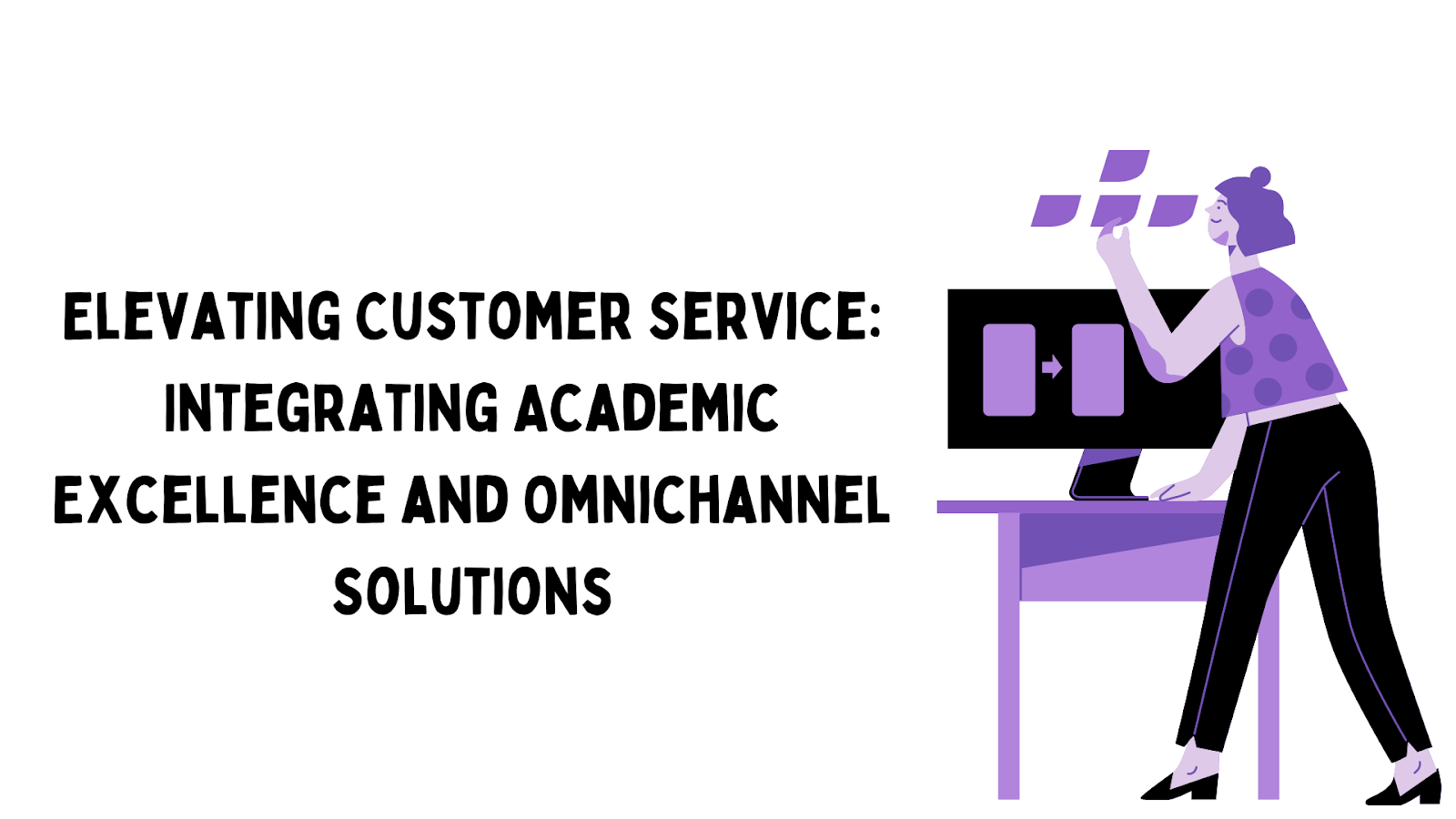Delivering exceptional customer service is essential for companies to thrive and ensure user satisfaction. With new technologies and high expectations, customers want the best experiences. Businesses must find creative ways to stand out. One powerful idea is combining academic research and omnichannel platforms. This helps understand what users want and deliver it seamlessly. Companies failing to integrate these strategies risk falling behind.
How Customer Service Has Changed
Customer service used to be simple – talking face-to-face or over the phone. Now, users expect service across numerous channels, including text, social media, chatbots, and more. They want consistent and personalized help wherever they are. Companies find it challenging to meet these demands. The key is using academics and omnichannel tools wisely.
Why Blending Academics and Omnichannel Matters
Academic disciplines like data science uncover insights into customer behaviors and preferences. Omnichannel systems provide smooth service across all platforms. Together, they enable completely tailored experiences that impress users. This blend represents the future of customer service. Companies must embrace it or disappoint customers.
Preview of Key Ideas
Smart integration requires using academics to get user insights, implementing omnichannel for seamless service, studying examples of success, and overcoming challenges. The next sections explore these strategies to create customer service that stands out.
Using Academics to Understand Users
Research in psychology, data science, and related fields offers proven models for service improvement.
Leveraging Interdisciplinary Approaches
Customer service excellence requires integrating insights from multiple fields. Academic research in areas such as technology, marketing, and organizational behavior reveals best practices for service design and delivery. Cross-functional teams allow applying diverse expertise to customer challenges.
Building Robust Omnichannel Platforms
Technology enables seamless omnichannel experiences. Academic programs in computer science play a crucial role in designing unified systems for integrated service across channels. Data analytics from information schools identify customer journeys and pain points.
Cultivating a Customer-Centric Culture
Research in organizational behavior on corporate culture offers models to promote customer-centricity. Leadership training, grounded in academic findings, rallies staff around the pursuit of service excellence. Scholarship-guided change management maintains customer focus during shifts.
Measuring Impact with Academic Rigor
Academic methods such as experimental design and statistical analysis ensure customer initiatives deliver ROI. Marketing schools lead the way in measuring omnichannel effectiveness. Social science surveys assess customer satisfaction. Quantitatively demonstrating results maintains stakeholder commitment.
Developing Skills through Continuing Education
Lifelong learning programs enable employees to continuously upgrade their service capabilities. University professional development offers the latest customer service skills. Earning nano degrees in UX design, data visualization, and other relevant fields builds expertise in omnichannel service. Academic training sustains a cutting-edge workforce.
The Evolution of the Customer Service Landscape
The past decade has seen a rapid transformation in the customer service field, driven by evolving consumer preferences, emerging technologies, and shifting competitive dynamics. Customers used to interact with businesses through call centers and retail stores.
Now, they expect support through mobile apps, social media, live chat, and other digital and offline touchpoints, including IoT devices. Their expectations have also risen substantially. They expect instant, 24/7 service, and highly personalized interactions. They also expect seamless experiences when transitioning between channels.
Legacy customer service models have struggled to keep pace with these changes. Successful players are integrating academic insights around human psychology and behavior with AI-powered omnichannel platforms to address these issues.
By leveraging the contact center in the cloud, companies can meet modern expectations more effectively. This integration allows businesses to overcome challenges such as lost business, negative brand perceptions, and diminished loyalty. Companies that fail to adapt face substantial risks. However, with the right call center software integration, these challenges can be mitigated, ensuring better customer experiences and long-term success.
Harnessing Data Analytics for Personalization
Mining Data to Predict User Needs
Data science techniques extract insights from customer data to predict future needs. Analyzing purchase history and location data can predict when a customer might need specific products. Companies can proactively offer solutions.
Tailoring to Individual Preferences
Techniques such as machine learning classify customers with common traits. Companies can then provide personalized recommendations to each group, increasing satisfaction.
Omnichannel Platforms for Consistent Experiences
While academics reveal user needs, omnichannels ensure flawless service across all platforms.
Unifying Touchpoints for Consistency
Omnichannel integration links various touchpoints through shared data and unified processes. This enables consistent experiences. For instance, it allows users to switch from chat to phone seamlessly, without having to restart the conversation.
Smooth Transitions Between Channels
Omnichannel systems allow seamless hand-offs between channels. Chatbots can instantly redirect users to human agents when required. This prevents frustration.
Enhanced Support Through Technology
AI Chatbots Provide Instant 24/7 Help
Chatbots use natural language processing to understand requests and immediately respond with answers from knowledge bases. This gives quick help at any time.
Integrated CRM for Complete User Histories
Unified CRM systems provide agents with comprehensive records across channels. This empowers personalization based on all past interactions.
Overcoming Challenges to Implementation
While integrating academics with omnichannel strategies offers significant benefits, it also presents several challenges:
Addressing Resistance to Change
Staff might resist the transition from existing systems. Building support is crucial.
Explaining the Benefits of New Approaches
Sharing scientific proof about advantages can demonstrate value, driving adoption.
- Ongoing Training and Resources: Providing ongoing guidance and resources ensures staff correctly apply new techniques, reducing the risk of abandonment.
- Modernizing Outdated Technology: Legacy systems may limit capabilities. Strategic investments and partnerships enable modernization.
- Investing in Current Infrastructure: Allocate resources to update outdated platforms preventing omni-channel integration.
- Partnering with Tech Innovators: Collaborating with leading vendors provides access to the newest technologies.
Conclusion
The complexity of the customer service landscape will continue to increase. Companies that integrate academic research around behavior and preferences with omnichannel systems will gain a sustainable competitive advantage. They must make these strategies core priorities, not optional initiatives.
The time for action is now before customers defect to competitors offering superior experiences underpinned by scientific, unified approaches. Companies failing to continuously elevate their service by integrating academic excellence with innovative delivery risk becoming irrelevant. By ambitiously forging ahead today, businesses can delight customers, unlock lasting loyalty, and lead their industries tomorrow.
Key Takeaways
Data analytics offer ways to understand users. Omnichannel platforms enable consistent, personalized interactions. Success stories prove results. Addressing resistance and technology barriers enables implementation.
Blending scientific knowledge with omnichannel capabilities drives innovation. The future is based on this integration – it is key to astonishing service. The time to act is now. Leaders must commit to knowing users scientifically and serving them seamlessly across channels. This strategy will become the new standard, setting businesses apart. Companies must integrate academics and omnichannel or be left behind.
Frequently Asked Questions
- How can academic theories improve real-world customer service?
Academic insights from data science provide scientifically tested models to enhance communications, anticipate needs, categorize customers, and influence behavior. Applying these theoretical frameworks in customer service settings allows companies to elevate experiences based on objective evidence.
- What are the big challenges in rolling out omnichannel services, and what helps address them?
Major hurdles include outdated IT systems, internal resistance to change, and insufficient employee training. Investing in current tech, touting benefits, and providing ongoing guidance helps tackle these obstacles.
- Which industries have seen the biggest impact from this integration?
Retail, banking, insurance, and hospitality have improved dramatically with an integrated approach. The ability to decipher motivations and serve customers consistently across physical and digital touchpoints has increased sales, satisfaction, and loyalty for these sectors.




